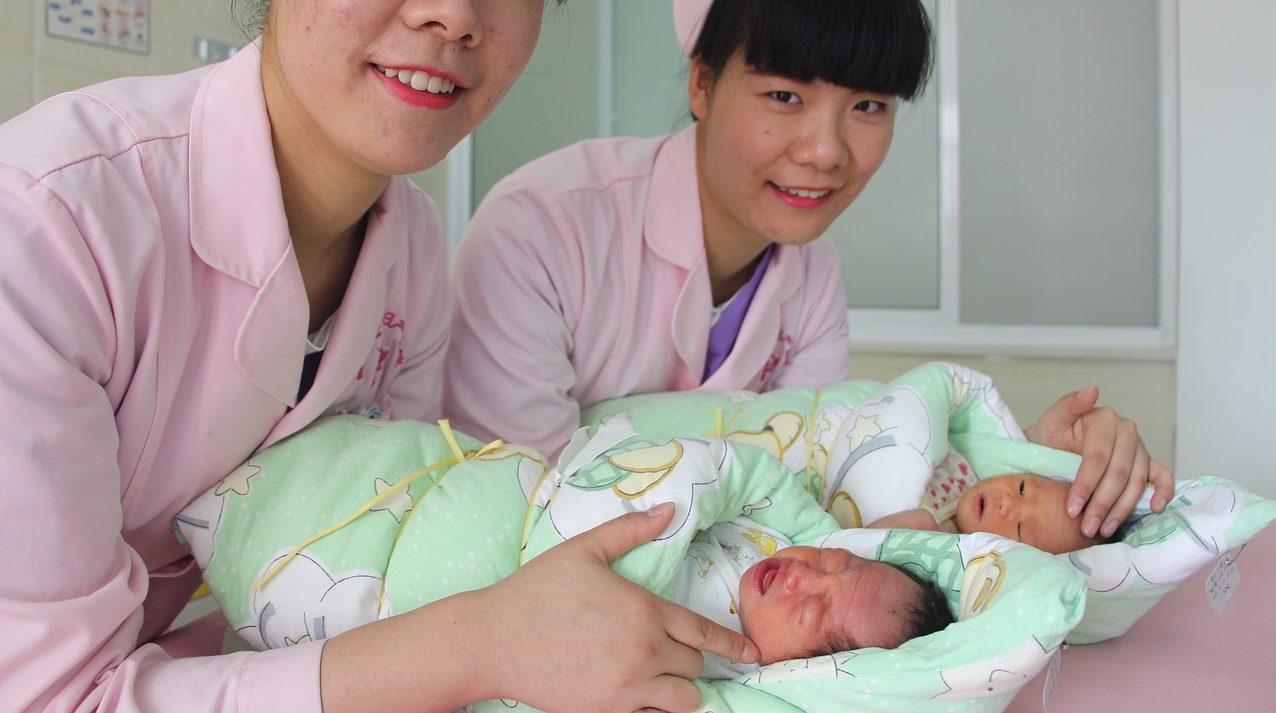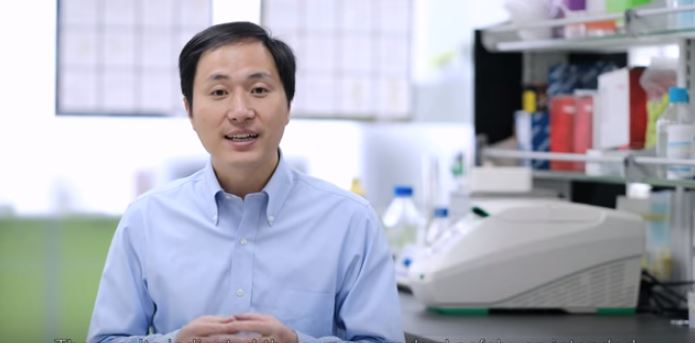

Lifestyle
Chinese scientist edits twin human baby genes to prevent HIV infection
A Chinese scientist and professor named Dr. He Jiankui claimed this week that he edited the genes of recently born twin girls while they were embryos. Using a technique called CRISPR-Cas9, the gene responsible for allowing HIV to infect the body was altered to mimic a natural genetic variation in some humans that confers strong resistance to the virus. The father of the babies in the study is HIV positive, a fact which motivated the study and the family’s willingness to take part.
The study’s twins, referred to as “Lulu and Nana”, are said to be in excellent health, and the full details of the corresponding study promised to be provided for public review in the near future. Dr. He, who studied at Rice University in Texas and Stanford University in California, is expected to speak at the Second International Summit on Human Genome Editing in Hong Kong on Wednesday where further evidence may be presented. Thus far, none has been made available, although Dr. He’s previous work is well known to those in the field, giving certain merit to his claims.
The response to Dr. He’s announcement has, thus far, been overwhelmingly negative along with the validity of the claims being questioned. The ethics of gene editing in babies is decidedly set against the practice in the global scientific community, and a significant number of organizations have issued public statements strongly condemning the professor’s work. The Chinese government has also since ordered an inquiry. While an explicit ban on gene editing on embryos intended for reproduction does not exist in the country, strict ethical guidelines recommend strongly against the practice.

Additionally, Dr. He adamantly denies that his research and work in gene editing serves the purpose of the infamous “designer baby” concept. “For forty years, regulations and morals have developed together with IVF [and gene editing is another] advancement…only meant to help a small number of families,” he stated in his video published November 25th. In an interview with the AP, he defined his goal as bestowing traits that resist future infections from diseases like HIV, the AIDS virus.
The process involved in editing the twin girls’ DNA, as described, began as a regular In Vitro Fertilization (IVF) process wherein the mother’s eggs were fertilized by the father’s sperm to create an embryo in a laboratory environment. At that stage, a CRISPR/Cas9 protein with gene editing instructions was introduced to amend the embryo DNA, and those embryos were subsequently implanted in the mother. Dr. He has claimed that the resulting genomes were assessed at the embryonic stage, during pregnancy, and after birth to confirm that the intended gene alone was changed.

The hospital claimed to have approved Dr. He’s research, Shenzhen Harmonicare Women’s and Children’s Hospital, has denied having a relationship with Dr. He or any involvement in the experiment. They have also lodged a police report in this regard. Additionally, Southern University of Science and Technology, the university where Dr. He is employed, stated that the professor has been on unpaid leave since February 1, 2018, thus the research involved with the twins was not affiliated with the school.
One of the primary concerns with editing genomes at the embryo level is the long-term impact on both the humans in question and their offspring who will inherit the modified genes. The edited DNA would eventually enter the general population as it passed on through generations. In this study, CCR5, a gene used to make a protein HIV needs to enter cells, was disabled in the twins’ DNA, an edit which effectively shuts off the “gateway” through which the virus infects the body. Although no unintended consequences have yet been observed in this example, scientists overall point to years of study still needed before clinical treatment can ethically be conducted.
One of the ethical guidelines involved in gene editing is restricting its use to only addressing medical needs which cannot be effectively treated through other means. In denouncing the driver of Dr. He’s study, specifically in addressing HIV via gene editing, safe-sex was recommended as a preventative along with current medical treatments in the case of infection by the director of the Oxford Uehiro Centre for Practical Ethics at the University of Oxford. Opposing the opinion of the medical community, however, a recent study by the Sun Yat-Sen University in China found that around 60% of Chinese people have a favorable view of gene editing for disease therapy. Professor He has also pointed to the discrimination faced by Chinese people with HIV as further motivation for his controversial work.
Watch the below video He Jianjui published announcing the gene surgery:
Lifestyle
EV fans urge Tesla to acquire Unplugged Performance for edge in fleet and security industry
Unplugged Performance has built a name for itself by producing performance upgrades for Tesla vehicles.

A growing number of Tesla enthusiasts and longtime community voices are calling on the electric vehicle maker to acquire Unplugged Performance, a California-based aftermarket company best known for tuning Tesla vehicles and developing specialized government fleet solutions under its UP.FIT division.
The idea was once considered a niche proposal among EV fans, but it is now gaining serious attention not just as a performance play but as a strategic move to deepen Tesla’s roots in the fleet and security industry.
A strategic fit
Unplugged Performance has built a name for itself by producing performance upgrades for Tesla vehicles, from track-optimized components to visual and aerodynamic upgrades. But in recent years, its UP.FIT division has pivoted toward a more functional future by outfitting Tesla vehicles like Model Ys for police, military, and government use.
That work has sparked growing calls for closer collaboration with Tesla, especially as the EV maker increasingly leans into autonomy, AI, and fleet services as core components of its next chapter.
“I posted this four years ago, but I think it’s more true now than ever,” wrote Whole Mars Catalog, a well-known Tesla investor and FSD Beta tester, on X. “Tesla should buy Unplugged. But not just as a Performance division. What they are doing with UP.FIT unlocks large government and commercial fleet purchases that can improve utilization.”
Tesla fans such as shareholder Sawyer Merritt echoed the sentiment, calling Unplugged a “great fit within Tesla.” adding, “They are literally located directly next to Tesla’s design studio in Hawthorne.”
Enabling the next wave
Supporters of the idea noted that integrating Unplugged into Tesla’s corporate structure could help accelerate the adoption of autonomous technologies in government sectors. With UP.FIT patrol cars already in use across some U.S. police departments, Tesla fans envisioned a future where self-driving Teslas could potentially revolutionize law enforcement, search-and-rescue, and public service logistics.
“Just imagine how autonomous patrol cars could transform policing and bring us into a safer future,” the veteran FSD tester wrote.
The benefits could also extend to Tesla’s existing consumer base. “They also have some incredible products in the works that I think will appeal to many ordinary Tesla drivers — not just those looking for performance or mods. Stuff that’s so good it should have come straight from the design studio next door,” Whole Mars Catalog noted.
Unplugged Performance, founded in 2013, shares not just a product vision with Tesla, but also geography. Its Hawthorne headquarters sits directly adjacent to Tesla’s design studio, and the two companies have maintained a close working relationship over the years. The aftermarket firm has long positioned itself as a “mission-aligned” partner to Tesla.
In response to the recent calls for acquisition, Unplugged Performance acknowledged the support from the community. “Our very existence is to support the Tesla mission with @UpfitTesla and @UnpluggedTesla,” Unplugged CEO Ben Schaffer posted on X. “We love working with Tesla and are grateful for the community’s support since 2013!”
Elon Musk
X account with 184 followers inadvertently saves US space program amid Musk-Trump row
Needless to say, the X user has far more than 184 followers today after his level-headed feat.

An X user with 184 followers has become the unlikely hero of the United States’ space program by effectively de-escalating a row between SpaceX CEO Elon Musk and President Donald Trump on social media.
Needless to say, the X user has far more than 184 followers today after his level-headed feat.
A Near Fall
During Elon Musk and Donald Trump’s fallout last week, the U.S. President stated in a post on Truth Social that a good way for the United States government to save money would be to terminate subsidies and contracts from the CEO’s companies. Musk responded to Trump’s post by stating that SpaceX will start decommissioning its Dragon spacecraft immediately.
Musk’s comment was received with shock among the space community, partly because the U.S. space program is currently reliant on SpaceX to send supplies and astronauts to the International Space Station (ISS). Without Dragon, the United States will likely have to utilize Russia’s Soyuz for the same services—at a significantly higher price.
X User to the Rescue
It was evident among X users that Musk’s comments about Dragon being decommissioned were posted while emotions were high. It was then no surprise that an X account with 184 followers, @Fab25june, commented on Musk’s post, urging the CEO to rethink his decision. “This is a shame this back and forth. You are both better than this. Cool off and take a step back for a couple days,” the X user wrote in a reply.
Much to the social media platform’s surprise, Musk responded to the user. Even more surprising, the CEO stated that SpaceX would not be decommissioning Dragon after all. “Good advice. Ok, we won’t decommission Dragon,” Musk wrote in a post on X.
Not Planned, But Welcomed
The X user’s comment and Musk’s response were received extremely well by social media users, many of whom noted that @Fab25june’s X comment effectively saved the U.S. space program. In a follow-up comment, the X user, who has over 9,100 followers as of writing, stated that he did not really plan on being a mediator between Musk and Trump.
“Elon Musk replied to me. Somehow, I became the accidental peace broker between two billionaires. I didn’t plan this. I was just being me. Two great minds can do wonders. Sometimes, all it takes is a breather. Grateful for every like, DM, and new follow. Life’s weird. The internet’s weirder. Let’s ride. (Manifesting peace… and maybe a Model Y.)” the X user wrote.
Lifestyle
Tesla Cybertruck takes a bump from epic failing Dodge Charger
The Cybertruck seemed unharmed by the charging Charger.

There comes a time in a driver’s life when one is faced with one’s limitations. For the driver of a Dodge Charger, this time came when he lost control and crashed into a Tesla Cybertruck–an absolute epic fail.
A video of the rather unfortunate incident was shared on the r/TeslaLounge subreddit.
Charging Charger Fails
As could be seen in the video, which was posted on the subreddit by Model Y owner u/Hammer_of_something, a group of teens in a Dodge Charger decided to do some burnouts at a Tesla Supercharger. Unfortunately, the driver of the Charger failed in his burnout or donut attempt, resulting in the mopar sedan going over a curb and bumping a charging Cybertruck.
Ironically, the Dodge Charger seemed to have been parked at a Supercharger stall before its driver decided to perform the failed stunt. This suggests that the vehicle was likely ICE-ing a charging stall before it had its epic fail moment. Amusingly enough, the subreddit member noted that the Cybertruck did not seem like it took any damage at all despite its bump. The Charger, however, seemed like it ran into some trouble after crashing into the truck.
Alleged Aftermath
As per the the r/TeslaLounge subreddit member, the Cybertruck owner came rushing out to his vehicle after the Dodge Charger crashed into it. The Model Y owner then sent over the full video of the incident, which clearly showed the Charger attempting a burnout, failing, and bumping into the Cybertruck. The Cybertruck owner likely appreciated the video, in part because it showed the driver of the Dodge Charger absolutely freaking out after the incident.
The Cybertruck is not an impregnable vehicle, but it can take bumps pretty well thanks to its thick stainless steel body. Based on this video, it appears that the Cybertruck can even take bumps from a charging Charger, all while chilling and charging at a Supercharger. As for the teens in the Dodge, they likely had to provide a long explanation to authorities after the incident, since the cops were called to the location.
-

 Elon Musk1 day ago
Elon Musk1 day agoWaymo responds to Tesla’s Robotaxi expansion in Austin with bold statement
-

 News1 day ago
News1 day agoTesla exec hints at useful and potentially killer Model Y L feature
-

 Elon Musk2 days ago
Elon Musk2 days agoElon Musk reveals SpaceX’s target for Starship’s 10th launch
-

 Elon Musk3 days ago
Elon Musk3 days agoTesla ups Robotaxi fare price to another comical figure with service area expansion
-

 News1 day ago
News1 day agoTesla’s longer Model Y did not scale back requests for this vehicle type from fans
-

 News1 day ago
News1 day ago“Worthy of respect:” Six-seat Model Y L acknowledged by Tesla China’s biggest rivals
-

 News2 days ago
News2 days agoFirst glimpse of Tesla Model Y with six seats and extended wheelbase
-

 Elon Musk2 days ago
Elon Musk2 days agoElon Musk confirms Tesla is already rolling out a new feature for in-car Grok


















